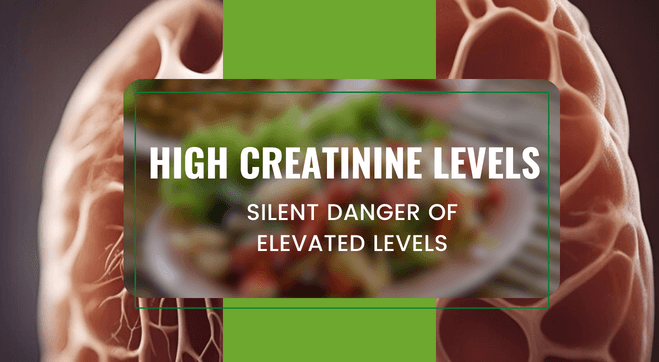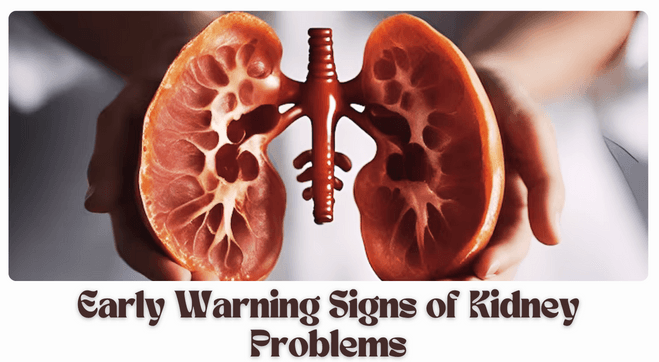Creatinine is a waste product produced by muscles during their normal functioning. Your kidneys, when they work normally, help filter out creatinine and other waste from the blood. Thus, measuring your creatinine levels can tell you a lot about the health of your kidneys. A creatinine blood test is done to check how well the kidneys are functioning. A normal creatinine level is 0.7 to 1.3 mg/dL for men and 0.6 to 1.1 mg/dL for women
If there is low or high creatinine in the blood, it may indicate an underlying condition. High creatinine levels typically point towards your kidneys not working as well as they should, whereas low creatinine levels indicate that something is impacting how much creatinine is made in the body. In this article, we’ll read more about the symptoms of high creatinine levels, what the causes are, and how this can be diagnosed and treated.
Common Symptoms Of High Creatinine Levels
The Signs and symptoms of high creatinine Levels may vary based on the condition that is causing it. The following conditions, for instance, cause the symptoms listed under each of them:
Kidney Infection
Kidney infection can damage the kidneys if it is left untreated. In the most extreme cases, it can even cause kidney failure. Some of the symptoms of this include:
- Fever
- Frequent or painful urination
- Localized pain
- Kidney failure urine appears bloody, cloudy, or dark
- Chills and nausea
- Foul-smelling urine
Drug-Induced Toxicity
Some medications can damage the functioning of the kidneys 1. Examples of these drugs are antibiotics, cardiovascular drugs, diuretics, chemotherapy drugs, proton pump inhibitors, and lithium. The symptoms that go along with this are:
- Fluid retention
- Changes in the amount of urine that is passed
- Feeling fatigued
- Confusion
- Shortness of breath and cheap pain
- Nausea and irregular heart rate
Glomerulonephritis
This is a condition 2 that occurs when certain parts of your kidneys, which are responsible for filtering your blood, become inflamed. This can cause symptoms like:
- High blood pressure
- Foamy or bloody urine
- Fluid retention in the feet, hands, and face
High blood pressure
Consistently elevated blood pressure can strain the kidneys filtering units, reducing their ability to remove waste and excess fluids from the body efficiently. This can ultimately contribute to the development of conditions such as chronic kidney disease or even kidney failure.
Usually, high blood pressure, while dangerous, is not accompanied by symptoms. That is why it is important to do regular full-body health checkups so you can detect something like this.
Diabetes
Diabetes stands as the primary contributor to kidney disease, with approximately 1 in every 3 adults diagnosed with diabetes eventually developing kidney complications.
Diabetes appears when your blood sugar levels are extremely high. Raised blood sugar can cause several problems, including kidney disease. Some of the related symptoms you may notice are as follows:
- Increased thirst, urination, and appetite
- Fatigue
- Blurry vision
Urinary Tract Blockage
There are numerous reasons why your urinary tract would become blocked. If it happens, it would cause symptoms like:
- Frequent or painful urination
- Blood in the urine and pain in the back or side
- Weak urine system
- Feeling fatigued
Heart Disease
A lot of conditions that impact heart health can also impact the blood vessels and the kidneys. Some symptoms you can expect are:
- Chest pain
- Abnormal heartbeat and shortness of breath
- Feeling weak
- Paralysis and difficulty speaking
Kidney Failure
Kidney failure affects kidney functioning and is pretty much the most common cause of having high creatinine levels. Some of the symptoms you can expect are:
- Fluid retention
- Feeling fatigued
- Headache or confusion
- Nausea
- Muscle cramps
- Itchy feeling
Common Causes Of High Creatinine Levels
High creatinine levels in the blood can result from various factors and understanding the diverse causes of elevated creatinine levels is essential for accurate diagnosis and appropriate management of underlying conditions.
The most common causes of high creatinine levels are many, including:
- Drug toxicity
- Kidney infection
- Diabetes
- Glomerulonephritis
- Heart disease
- High blood pressure
- UTI blockages
- Kidney failure
Typically, a doctor will need to treat the underlying condition to bring creatinine levels back up.
Complications And Risks Of High Creatinine Levels
Creatinine, a waste product created as a result of muscle metabolism, is normally filtered out by the kidneys and exits the body in the urine. High creatinine levels in the blood may signify kidney dysfunction including chronic kidney disease (CKD), when the kidneys gradually lose their ability for filtration, leading to a build-up of waste in the body.
It may also indicate acute kidney Injury (AKI) 3. High creatinine levels can also increase the chances of cardiovascular illnesses, including heart attacks, hypertension, and strokes (this is due to the kidney’s role in blood pressure and electrolyte balance).
Additionally, improper functioning of the kidneys may result in Electrolyte Imbalance which can lead to muscle cramps, arrhythmia (irregular heartbeats), and general weakness and fatigue.
Book Electrolyte Test At HomeHigh Creatinine Levels Diagnosis
Typically, creatinine levels are diagnosed using a urine test or blood test.
Blood Creatinine Test
Blood is taken from a vein in your arm as part of this test, which is then sent for further analysis to the lab.
The normal range of creatinine is as follows:
- US units: 0.84 to 1.21 mg/dL
- European units: 74.3 to 107 micromoles per liter
If your levels fall above or under this, your doctor will likely repeat this test or ask you to undergo a urine test.
Urine Creatinine Test
You are required to provide a sample of your urine, which is tested in a lab. You may be required to stop taking antibiotics and medicines such as Cimetidine, Famotidine, and Ranitidine temporarily.
The normal range for this is as follows:
- US units: 955 to 2,936 mg/day for men; 601 to 1,689 mg/day for women
- European units: 8.4 to 25.9 millimoles per 24 hours for men; 5.3 to 14.9 for women
Again, if your urine creatinine levels are high, you may need to get additional tests done or repeat a test for the doctor to determine the cause of creatinine in your urine.
High Creatinine Levels Treatment And Management
Treatment 4 for high creatinine levels is usually prescribed depending on the cause.
If a kidney infection is the effect of high creatinine levels, treatment with a course of antibiotics should restore normalcy.
Similarly, if the increased creatinine levels are due to high blood pressure, oral medication to normalize blood pressure would be sufficient to lower creatinine levels as well.
Depending upon the cause of increased creatinine levels, doctors may suggest making changes to your daily habits such as reducing your protein intake, and simultaneously, increasing dietary fibre.
If, however, someone has kidney failure, they may be prescribed medications and dialysis to filter toxins and waste products from the blood. For people afflicted with end-stage renal disease, a kidney transplant is recommended.
People who are experiencing a temporary creatinine level increase will usually see their symptoms quickly resolve after following a suitable treatment plan.
Foods to Eat and Avoid To Reduce Creatinine Levels In the Body
Here are some of the best foods to lower creatinine levels naturally:
- Fibre: Some studies have shown a marked drop in creatinine levels in someone with chronic kidney disease who raised their intake of fibre-rich foods 5 such as vegetables, whole grains, and legumes.
- Water: Drinking lots of water 6 at bedtime can reduce creatinine temporarily.
- Fruits: Fruits like berries, kiwis, and apples can help lower creatinine levels. In fact, it can also lower the risk of kidney disease 7.
Here’s a list of things you should avoid to lower creatinine:
- Supplements containing creatine: Creatine is a natural product made in your liver, and is transported to your muscles for energy. When this happens, creatine is degraded to form creatinine, a metabolic byproduct. Creatine is available in the form of an oral supplement. But if you’re trying to improve your kidney functioning, it is best not to use it.
- Reduce protein intake: Eating large measures of protein can increase your creatinine levels. Cooked red meat 8 can also increase creatinine.
- Reduce salt intake: Excess salt in processed food has the potential to cause renal complications.
- Avoid overuse of NSAIDs: Non-steroidal anti-inflammatory drugs (NSAIDs) may be dangerous if taken too often or in amounts exceeding the recommended daily dosage if you have renal issues.
- Avoid smoking: Smoking 9 can significantly increase the risk of chronic kidney disease.
- Limit alcohol intake: While moderate amounts of alcohol may diminish the risk of chronic kidney disease, excessive intake of alcohol can damage your kidneys. It can also cause hypertension.
What Medications Can Help Lower High Creatinine Levels?
There are specific drugs to lower creatinine levels, such as:
- Medication: ACE: Certain medications that include ACE inhibitors or angiotensin II receptor blockers could help protect the kidneys.
- Diabetes medication: By managing diabetes with insulin or oral hypoglycemic agents, blood sugar levels can be kept in check, thus reducing the risk of kidney damage, which in turn improves creatinine levels.
- Statins: These medications are utilised to lower cholesterol levels. Managing cholesterol levels with statins, in turn, supports kidney health.
- Diuretics or water pills: Diuretics help the body eliminate excess fluid and sodium, improving kidney function.
- Corticosteroids: In case of inflammation of the kidneys, corticosteroids are prescribed to reduce inflammation and improve kidney function.
- Allopurinol: This medication is used to treat increased uric acid levels, which can induce kidney stones. Allopurinol can help control the formation of uric acid crystals and thus, reduce risks of kidney damage and indirectly influence creatinine levels.
Frequent monitoring enables medical professionals to monitor the efficacy of treatments and modify interventions as necessary. People can reduce their risk of consequences including electrolyte imbalances and cardiovascular problems related to renal disease by controlling their creatinine levels. Monitoring also directs dietary and lifestyle changes that promote kidney health. In general, maintaining renal function and advancing general health greatly depends on careful control of creatinine levels.
Disclaimer
The information listed here is strictly for educational purposes and is not intended to offer personal medical advice. Do consult your physician for any questions you may have regarding a medical condition. It’s not advised to disregard professional medical advice or delay in seeking it because of any information listed here. The Nutrition Source does not recommend or endorse any products.
Sources
Ref Links:
- Drug-induced impairment of renal function- NLM
- A Comprehensive Review Study on Glomerulonephritis- NLM
- Creatinine Kinetics and the Definition of Acute Kidney Injury- NLM
- The Top 10 Things Nephrologists Wish Every Primary – NLM
- Foods with added fiber lower serum creatinine levels- Pub Med
- Association between fluid intake and kidney function- NLM
- A Diet Rich in Vegetables and Fruit and Incident CKD- Pub Med
- Effect of a cooked meat meal on serum creatinine- Pub Med
- Association between smoking and chronic kidney disease- NLM









